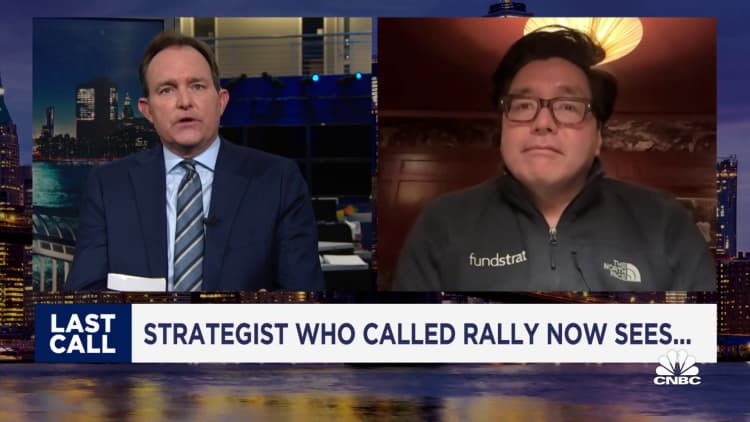Thomas Barwick | DigitalVision | Getty Images
It’s tempting to follow the crowd when it comes to investing.
While that may not always be wise, experts say one investment vehicle — exchange-traded funds — might be worth a second look now.
“It’s been a huge growth engine in the fund universe,” said Bryan Armour, director of passive strategies research for North America at Morningstar, a provider of investment research.
“That’s led to more products, more strategies, more active managers moving into the ETF space than ever before,” Armour said.
ETFs offer ‘the best of both worlds’
Year over year, more money has gone into ETFs than mutual funds. In 2022, the range was widest, Armour said.
ETFs, which first debuted in the 1990s, are much younger than mutual funds. They also offer certain distinct characteristics.
“Our research has shown over the years that cost is one of the best predictors of future success,” Armour said. “And ETFs are a lot cheaper than mutual funds.”

ETFs are priced, and can be traded, throughout the day. Mutual fund orders, in contrast, are typically executed once a day, with all investors receiving the same price.
“It’s a mutual fund that trades like a stock,” Todd Rosenbluth, head of research at VettaFi, said of ETFs.
Rosenbluth, a former stock and mutual fund analyst, today focuses specifically on ETFs, which he said “offers the best of both worlds.”
To be sure, while ETFs offer distinct advantages, they also have their downsides.
What you will pay to invest in ETFs
Jerry 2313 | Getty Images
ETFs offer several advantages when it comes to costs. There’s no investment minimum, as long as you can pay for a share, Armour said. And, in some cases ,you may be able to buy fractional shares, or a portion of a share.
ETFs also come with lower average expense ratios, fees investors pay for the management of a fund, Armour said. Plus, there are no distribution fees to compensate brokers who sell fund shares or pay for advertising, and there are no sales loads, or commissions to the professional selling you the fund.
ETFs also do not have to hold as much cash, which keeps their money invested in the strategy you’re buying, Armour said. Mutual funds, in contrast, hold cash to pay for redemptions, whereby investors are returned the money they paid for their shares.
“ETFs are just generally less expensive,” Rosenbluth said.
Of note, ETF investors may have to pay a flat commission fee to trade.
Tax consequences of investing in ETFs
Mutual funds have yearly distributions where they pass down capital gains and dividends to shareholders.
Mutual fund investors may owe either short- or long-term capital gains on those distributions, depending on how long they have been invested in the fund.
Because long-term capital gains come with lower rates, they’re preferable. However, if an investor has held the fund for a year or less, they will have to pay higher short-term capital gains rates.
While some mutual funds were down substantially in 2022, that prompted investors to redeem their shares, which also triggered capital gains, Armour noted.
Our research has shown over the years that cost is one of the best predictors of future success. And ETFs are a lot cheaper than mutual funds.
Bryan Armour
director of passive strategies research for North America at Morningstar
“As a fund holder in a mutual fund, you’re at the whims of other fund holders,” Armour said. “If they start selling, that might mean a taxable event for you.”
With ETFs, there’s no such similar taxable event, he noted.
“They’re much, much more tax-efficient than a mutual fund,” Armour said.
Of course, ETF investors will not be able to completely avoid taxes. They will have to pay taxes on their own capital gains. But because they get flexibility to choose that timing, they can hold off until they are eligible for the lower long-term rates.
‘It’s just an easier way to invest’
ETFs are a more efficient way of accessing a stock, bond or any other market asset class, according to Rosenbluth.
“You get the benefits of trading on an exchange; you get the benefits of diversification,” Rosenbluth said. “It’s just an easier way to invest.”
By investing in a fund rather than a single name stock, investors can hedge their risks.
“Stock picking can be very challenging, even for the pros,” Armour said.
ETF investors can also pick from a broad array of strategies, whether it be active or passive, or focused on emerging trends like artificial intelligence, cannabis or clean energy.
To be sure, there are limits. Generally, 401(k) plans do not offer ETFs in their investment lineup.
Moreover, investors interested in cryptocurrencies will still get the purest exposure by trading cryptocurrencies directly. But that may be poised to change, with spot Bitcoin ETFs in the works provided the SEC approves them.









